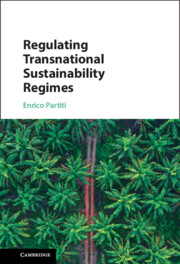Book contents
- Regulating Transnational Sustainability Regimes
- Regulating Transnational Sustainability Regimes
- Copyright page
- Contents
- Acknowledgements
- Abbreviations
- Introduction
- 1 Features, Typologies and Effects of Voluntary Sustainability Standards
- 2 Public Authority and Voluntary Sustainability Standards
- 3 Voluntary Sustainability Standards Under EU Competition Law
- 4 Voluntary Sustainability Standards and EU Market Regulation
- 5 Attribution and Expected Conduct of WTO Members Towards Voluntary Sustainability Standards
- 6 Transposing Technical Barriers to Trade Agreement Meta-rules to Voluntary Sustainability Standards
- Conclusion
- Bibliography
- Index
6 - Transposing Technical Barriers to Trade Agreement Meta-rules to Voluntary Sustainability Standards
Published online by Cambridge University Press: 12 May 2022
- Regulating Transnational Sustainability Regimes
- Regulating Transnational Sustainability Regimes
- Copyright page
- Contents
- Acknowledgements
- Abbreviations
- Introduction
- 1 Features, Typologies and Effects of Voluntary Sustainability Standards
- 2 Public Authority and Voluntary Sustainability Standards
- 3 Voluntary Sustainability Standards Under EU Competition Law
- 4 Voluntary Sustainability Standards and EU Market Regulation
- 5 Attribution and Expected Conduct of WTO Members Towards Voluntary Sustainability Standards
- 6 Transposing Technical Barriers to Trade Agreement Meta-rules to Voluntary Sustainability Standards
- Conclusion
- Bibliography
- Index
Summary
Chapter 6 studies the substantive meta-rules of the TBT Code of Good Practice. As the Appellate Body never provided interpretive guidance over these provisions, how to apply them to standards and VSS remains unclear. Chapter 6 analyses crucial TBT principles providing that standards do not discriminate, do not create unnecessary barriers to trade and are based on relevant international standards. The interpretation of similar TBT provisions concerning technical regulations is used as guidance in understanding the transposition of these obligations and in suggesting how these legal tests are applicable to VSS. The chapter acknowledges the peculiar nature of standards identifying products with distinct quality features such as VSS. It identifies relevant differences from technical standards that must be taken into account for interpretive purposes. These include the objectives pursued by a scheme that can be accepted as legitimate, the implications of the treatment-no-less-favourable standard on measures that structurally distort competitive opportunities and whether the detrimental impact generated stems exclusively from a legitimate regulatory distinction.
Keywords
- Type
- Chapter
- Information
- Regulating Transnational Sustainability Regimes , pp. 240 - 280Publisher: Cambridge University PressPrint publication year: 2022

